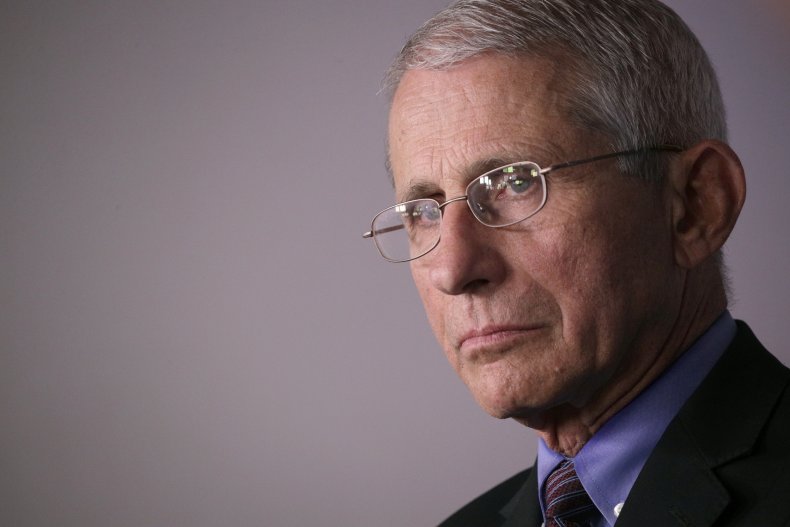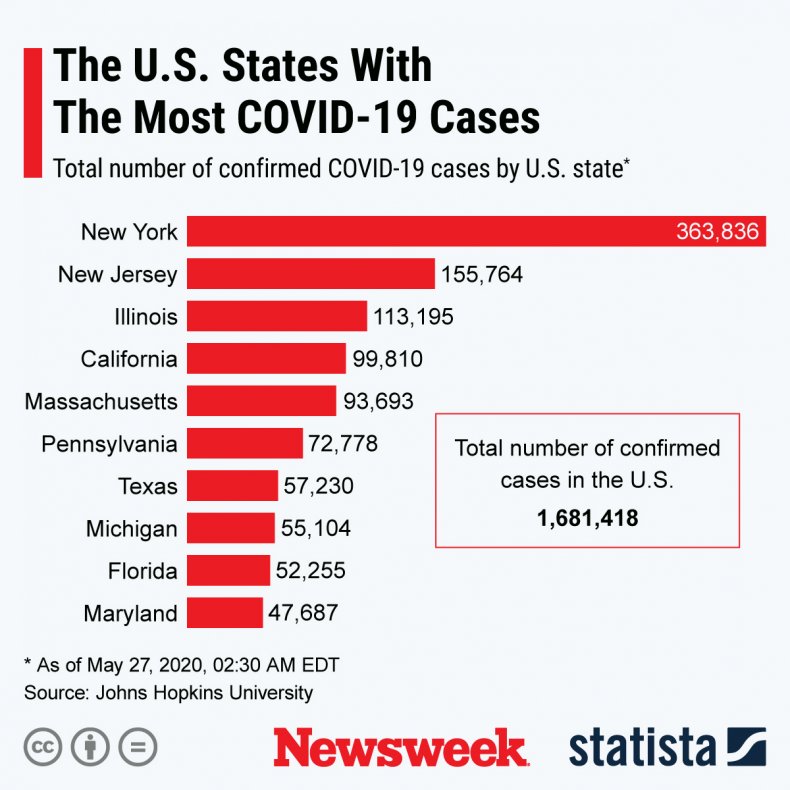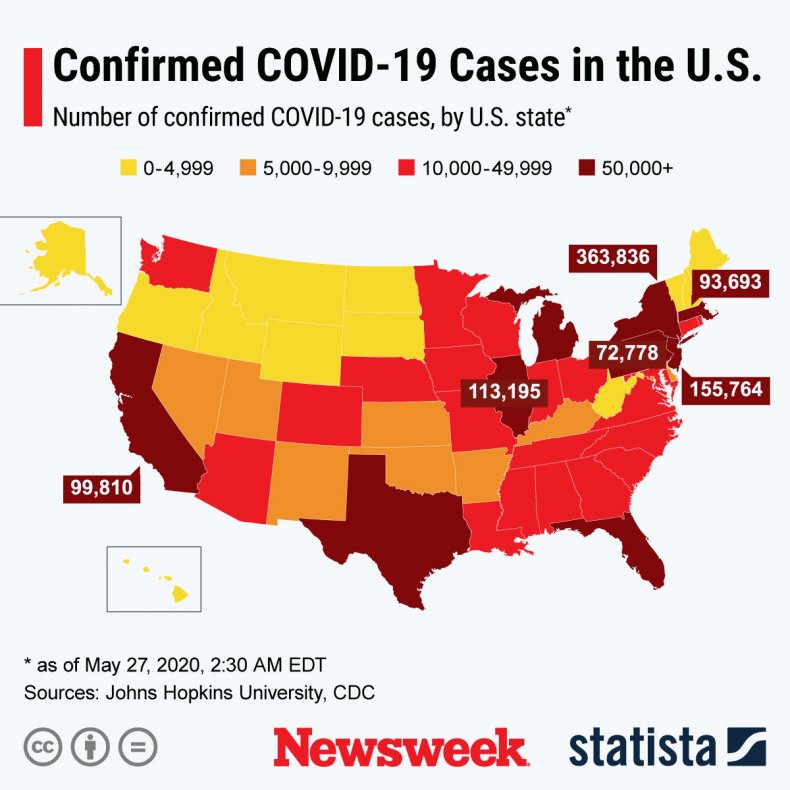As the U.S. continues to battle the novel coronavirus outbreak, fears over a second wave of cases have been looming over the country.
While there is no doubt that more cases will continue to emerge in the months ahead, it's not too late for America to prevent a second wave of COVID-19, according to Dr. Anthony Fauci, the director of the National Institute of Allergy and Infectious Diseases (NIAID) and member of the White House COVID-19 task force.
Speaking to Newsweek, Fauci says: "It's in our hands. We can prevent a second wave if we respond to the inevitable infections we'll see in the fall and winter.
"There's no doubt that this virus is not going to disappear from the planet by the time we get to the fall and the winter, because there's considerable activity right now in the United States, even though some cities and states are going down [in virus cases] from looking at the charts.
Fauci says that because the novel coronavirus is prevalent and highly transmissible, "I don't think there's a chance in the world that we're going avoid more infections…inevitably there will be infections in the fall and winter."
Fauci explained the virus is very difficult to completely control and eliminate and there will always be some infection in some part of the planet, especially since people are traveling.
"I mean, China is seeing that now. They practically completely suppressed the virus but now travel-related cases are coming back into China."
"But when those inevitable cases appear, it doesn't mean we inevitably will have a second wave. It's about how we respond to prevent these infections from becoming a true resurgent wave. It's in our hands, we've got to be able to grab the bull by the horns and be prepared," Fauci says.
What defines a 'true second wave'?
"I use the words 'second wave' with some reservations. It doesn't necessarily have to be a true second wave in the sense of a major outbreak. And whether that happens or not depends on how we're prepared to respond," Fauci says.
What defines a "true second wave" would depend on the size of the community involved. The scale of outbreaks such as those seen in the cities of New Orleans, Chicago, and Detroit would be considered a true second wave, Fauci explains.
"New York was a very special situation because it really got hurt very badly. God forbid, I hope we never get anywhere near seeing anything near like New York again," Fauci says.
We have four months to prevent a second wave
While many states are beginning to report a plateau in daily cases, yet more are still dealing with daily increases in new COVID-19 patients.
Fauci says whether or not these ongoing new cases will become a wave will depend on whether "we prepare ourselves from now through June, July, August and September."
"We have four months to make sure we have in place the system, the test, the capability, the manpower to do the kind of identification, isolation and contact tracing as cases begin to reappear in the fall, because they will reappear.
"For the kind of contact tracing that needs to be done, you need manpower. You need people who can be mobilized efficiently to do the kinds of contact tracing we need. If we have that, we could avoid a resurgence or what people would be calling a second wave," says Fauci.
Will the level of infections be worse in the coming months?
Fauci says that while some of the worst-hit parts of the country, including New York City, New Orleans and Detroit, have been starting to see a decline in new cases, "there are some other places, like where I live in Washington, D.C., where the number of cases is still not going down very much at all and staying at a plateau. It's the same in Chicago and Los Angeles.
"It's difficult to predict [what the level of infection will be]. It's tough to predict how things are going to be this summer. We're hoping that the numbers will go way down when we get to June, July and August. Perhaps there will be a decrease in cases because of the weather but we don't know yet if that will be a contributor or not. We hope we can get some help from the weather but we can't count on it," he adds.
In previous interviews with Newsweek, several scientists said there is too little known about the novel coronavirus to be able to assess whether warm weather can help kill off the virus.
Will COVID-19 ever be eradicated?
"When you look at infectious disease classically, there are three words that are generally used: control, elimination and eradication," Fauci says.
"I think it's highly unlikely that we will eradicate COVID-19. The only disease in humans that we've ever eradicated is smallpox. We've eliminated polio from many areas of the world. For example, polio is eliminated in the U.S. and U.K. and the only cases that are around are vaccine-related cases.
"So it is conceivable that we will be able to eliminate it in the sense of getting enough herd immunity together with the vaccine that we have very few cases. And certainly we can control it, and we have been getting it under some control in some areas," Fauci says.
One of the most difficult aspects of combating this virus has been its asymptomatic tendencies, which has highly complicated the control of the outbreak.
"It's very perplexing that you have a highly transmissible virus and that people who are without symptoms could easily transmit. That makes it difficult to control. So to me, that has been one of the most challenging things of this particular virus," Fauci says.
The novel coronavirus is more likely to be with us for another season or two, depending when a vaccine is ready, with the second season expected to be much milder than the first, especially if there is a vaccine, Fauci explains.
"If we have a vaccine by next winter, that would be a game changer but there's no guarantee we'll have it. But if we don't have a vaccine, we'll have another season of it and hopefully by the following season, we will have a vaccine."
U.S. will conduct up to 40 million tests per month
As of Wednesday, around 4.5 percent (14.9 million) of the U.S. population of nearly 330 million people have been tested for the virus, according to the latest figures from Johns Hopkins University. Nearly 314 million people in America have yet to be tested.
"We need to do better, and we will, hopefully we will, because we are told by the people who are responsible for the testing that as we get into the next month or two, we will be able to do 20 to 40 million tests per month. Then we'd be in good shape," Fauci says.
"We need a well-organized system at the state, city and local level, with guidance and help from the federal government, to be able to have enough tests as cases begin to resurge. We keep hearing people saying that we don't have enough testing capabilities, but we've got to put that behind us.
"We've got to have enough tests so that no one ever says 'We don't have enough tests' or that we don't have the testing capabilities to do it."

Vaccine on target for December
As of Wednesday, around 125 potential novel coronavirus vaccines were reported to be under evaluation, according to the latest report from the World Health Organization.
Back in March, the U.S. began the first human trial for a potential COVID-19 vaccine, which was developed by the biotechnology firm Moderna. The first phase of the trial for the mRNA-1273 vaccine is being conducted at Seattle-based Kaiser Permanente Washington Health Research Institute.
Emory University's Vaccine and Treatment Evaluation Unit in Atlanta, Georgia was added by NIAID, which is funding the trial, as a second test site for the first phase of the study.
"We're still in the preliminary stage [of the Moderna trial] but the data so far looked quite encouraging that even the intermediate doses, so not even the higher doses, induced antibodies…but the levels were as good, or better, than we expected," Fauci says.
A phase two trial is expected to be happening very soon, while the start of the phase three trial is being targeted for the very beginning of July.
"So for the time table [in terms of when we will have a vaccine ready], we're still where I predicted we would be months ago. Back in January, when we first started the development of a vaccine, I said it would be about a year to 18 months, if everything goes well, that we would have a vaccine that we would be able to deploy. We're very much on target with that.
"The Moderna trial is one trial but hopefully by late summer/early fall, there will be more than one trial at play. And if things work out, we hope to get an efficacy signal by late fall/early winter.
And if that is true—and there's always a big if, because it's entirely conceivable that the vaccine will not work—assuming that we have a safe and effective vaccine, a timetable that we would have enough doses [of the vaccine] by December I think would be not an unreasonable assumption.," Fauci says.
He warns "we proceed [with the vaccine] at risk but it doesn't mean at risk for the patient regarding safety and integrity of the science. The risk is to the financial investment."
Fauci explains that the vaccine could begin to be manufactured before it is known whether it is effective or not, instead of waiting to see if the vaccine works.
"It saves time and cuts several months of the process but it's very risky from a financial standpoint. But we feel given the urgency of the situation, it's worth taking that financial risk," Fauci says.
Wear a face mask even if you are social distancing
What states should be or shouldn't be doing in terms of their reopenings depends on the situation in the individual state, Fauci explains.
"But there are minimal things, to the extent possible that all individuals should be doing. One of them is wearing a mask, the other is keeping a physical distance and avoiding crowds. These are the things that should be done until you've reached a state where the level of infection is so low that you could pull back restrictions.
"I wear a mask all the time [in public]. You probably will not see a picture of me in public without a mask. I take the mask off when I'm alone in my office."
Fauci says he wears a mask even in public spaces where he will be practicing social distancing.
"The reason why you should still wear a mask, is that sometimes you think you're able to physically distance, but then you turn a corner and suddenly you're two feet away from five people. So that's why you should wear it in public, sort of as a backup," he explains.
"I don't know if masks should be required [in the sense of having people arrested] but you could strongly recommend [wearing masks], which we [the COVID-19 task force] do. We recommend social distancing, not going in crowds of more than 10 people, and wearing a mask.
"If you wash your hands frequently, physically distance and stay six feet away from people, wear a mask and avoid crowds, just those four things alone could go a very long way to containing infection," Fauci says.
The absurdity of herd immunity
Looking at the trajectory of the outbreak, could America have done anything different to fight the virus?
"Of course. Nobody's perfect. Anybody could have done better. Look at the U.K., they were going to go for herd immunity and that backfired on them," Fauci told Newsweek.
"If you look at the death per capita in Sweden, compared to the death per capita in other Scandinavian countries, Sweden got hit worse. I think their decision to go for herd immunity speaks for itself.
"I declared that herd immunity [as a COVID-19 combat strategy] was absurd at the very beginning here in the U.S., saying 'Are you kidding me? Do you know how many people are gonna die if you wait for herd immunity to come in?' So that was not a good call [in Sweden]," Fauci says.
The novel coronavirus, which was first reported in Wuhan, China, has infected more than 5.6 million people across the globe, including 1.6 million in the U.S. Over 351,000 have died while more than 2.3 million have reportedly recovered, as of Wednesday, according to the latest figures from Johns Hopkins University.
The graphic below, provided by Statista, illustrates the U.S. states with the most confirmed COVID-19 cases.

The graphic below, provided by Statista, illustrates the spread of the COVID-19 virus across the U.S.

COVID-19 - Latest - Google News
May 27, 2020 at 10:31PM
https://ift.tt/2B9ps2o
Dr. Anthony Fauci on How America Can Avoid a Second Wave of the Coronavirus - Newsweek
COVID-19 - Latest - Google News
https://ift.tt/2VQ2gy8

No comments:
Post a Comment